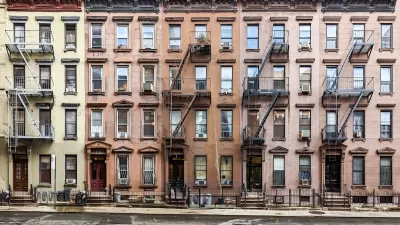If taxed at an average rate, the buyer of One57's $100.5 million penthouse should have paid $1.3 million in property taxes. Instead, the property was assessed at $17,000. Here's why.

Writing for CityLab, Kriston Capps examines the decidedly regressive turn property taxes have taken in Manhattan. Luxury residential supertalls, among them One57 with its $100.5 million penthouse, are quickly turning sections of Midtown into what some have dubbed "Billionaires' Row." For the purposes of tax assessment, though, these opulent 21st-century palaces might as well be workaday apartment buildings.
The underlying problem, says Capps, is historical. Changes to the tax code in the 1970s decisively favored condo owners to keep them in town. "The overarching sentiment behind property-tax reform in the 1970s was understandable: Homeowners were fleeing New York City, and lawmakers at the city and state level had to do something to stop the bleeding."
Current law determines taxes for now-luxurious condos by comparing them with apartments in the same outdated "category." From the article: "For stellar condo buildings—a category that has yet to be wholly accounted for in previous [tax] literature [...]—there simply are no rental apartment buildings that compare for tax purposes."
The effect, beyond rising unaffordability and inequality, is that untold millions go missing from city coffers. "Building luxury residential condos isn't the problem. Subsidizing luxury residential condos that rise out of reach of the city's levy is a crisis."
FULL STORY: Why Billionaires Don't Pay Property Taxes in New York

Maui's Vacation Rental Debate Turns Ugly
Verbal attacks, misinformation campaigns and fistfights plague a high-stakes debate to convert thousands of vacation rentals into long-term housing.

Planetizen Federal Action Tracker
A weekly monitor of how Trump’s orders and actions are impacting planners and planning in America.

In Urban Planning, AI Prompting Could be the New Design Thinking
Creativity has long been key to great urban design. What if we see AI as our new creative partner?

King County Supportive Housing Program Offers Hope for Unhoused Residents
The county is taking a ‘Housing First’ approach that prioritizes getting people into housing, then offering wraparound supportive services.

Researchers Use AI to Get Clearer Picture of US Housing
Analysts are using artificial intelligence to supercharge their research by allowing them to comb through data faster. Though these AI tools can be error prone, they save time and housing researchers are optimistic about the future.

Making Shared Micromobility More Inclusive
Cities and shared mobility system operators can do more to include people with disabilities in planning and operations, per a new report.
Urban Design for Planners 1: Software Tools
This six-course series explores essential urban design concepts using open source software and equips planners with the tools they need to participate fully in the urban design process.
Planning for Universal Design
Learn the tools for implementing Universal Design in planning regulations.
planning NEXT
Appalachian Highlands Housing Partners
Mpact (founded as Rail~Volution)
City of Camden Redevelopment Agency
City of Astoria
City of Portland
City of Laramie





























